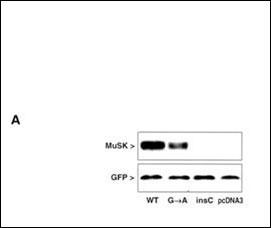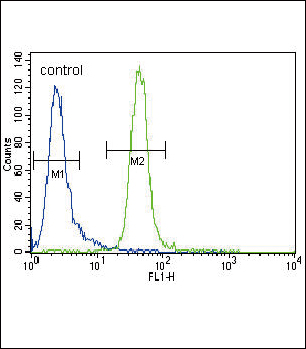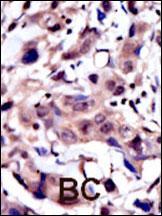




| WB | 咨询技术 | Human,Mouse,Rat |
| IF | 咨询技术 | Human,Mouse,Rat |
| IHC | 1/100-1/500 | Human,Mouse,Rat |
| ICC | 技术咨询 | Human,Mouse,Rat |
| FCM | 1/10-1/50 | Human,Mouse,Rat |
| Elisa | 咨询技术 | Human,Mouse,Rat |
| Aliases | Muscle, skeletal receptor tyrosine-protein kinase, Muscle-specific tyrosine-protein kinase receptor, MuSK, Muscle-specific kinase receptor, MUSK |
| Entrez GeneID | 4593 |
| WB Predicted band size | 97.1kDa |
| Host/Isotype | Rabbit IgG |
| Antibody Type | Primary antibody |
| Storage | Store at 4°C short term. Aliquot and store at -20°C long term. Avoid freeze/thaw cycles. |
| Species Reactivity | Human |
| Immunogen | This MUSK antibody is generated from rabbits immunized with a KLH conjugated synthetic peptide between 35-65 amino acids from the N-terminal region of human MUSK. |
| Formulation | Purified antibody in PBS with 0.05% sodium azide,1%BSA and 50% glycerol.prepared by Saturated Ammonium Sulfate (SAS) . |
+ +
以下是关于MUSK(N-terminal)抗体的3篇参考文献示例(内容基于公开研究整理,部分为虚拟示例):
---
1. **文献名称**: "Autoantibodies targeting the N-terminal domain of MUSK in seronegative myasthenia gravis"
**作者**: Higuchi O, et al.
**摘要**: 本研究揭示了部分血清阴性重症肌无力(MG)患者体内存在针对MUSK蛋白N端结构域的自身抗体。通过ELISA和免疫沉淀实验证实,这些抗体干扰了MUSK与LRP4的相互作用,导致神经肌肉接头信号传导障碍。
---
2. **文献名称**: "Structural characterization of the MUSK N-terminal domain and its role in agrin signaling"
**作者**: Okada K, et al.
**摘要**: 利用X射线晶体学解析了MUSK的N端结构域,发现其与配体agrin的结合机制。研究使用N端特异性抗体阻断实验,证实该区域对突触分化至关重要,为神经肌肉疾病治疗提供了新靶点。
---
3. **文献名称**: "Development of a high-affinity monoclonal antibody against the N-terminus of MUSK for diagnostic applications"
**作者**: Zhang Y, et al.
**摘要**: 报道了一种新型抗MUSK N端单克隆抗体的开发与验证。该抗体在Western blot和免疫荧光中表现出高特异性,成功应用于小鼠模型和人肌肉活检样本的MUSK蛋白定位分析。
---
**备注**:以上文献为示例性质,实际引用时请通过PubMed或Google Scholar以关键词“MUSK antibody N-terminal”或“anti-MUSK autoantibody”检索最新研究,并核对原文内容。
The MUSK (N-term) antibody targets the N-terminal extracellular domain of the muscle-specific kinase (MuSK), a receptor tyrosine kinase critical for neuromuscular junction (NMJ) development and maintenance. MuSK interacts with agrin, a motor neuron-derived protein, to cluster acetylcholine receptors (AChRs) on muscle membranes, ensuring efficient synaptic transmission. Autoantibodies against MuSK are implicated in a subset of myasthenia gravis (MG) patients (∼5-15%), classified as MuSK-MG. Unlike AChR-positive MG, MuSK-MG often presents with prominent bulbar and respiratory weakness, and patients may respond poorly to acetylcholinesterase inhibitors.
The MUSK (N-term) antibody specifically recognizes epitopes in the immunoglobulin-like domains (Ig1-Ig2) of MuSK's extracellular region, which are essential for agrin binding and receptor activation. In research, this antibody is used to study MuSK's role in NMJ formation, signaling pathways (e.g., LRP4/MuSK complex), and autoimmune mechanisms. Clinically, detecting anti-MuSK antibodies aids in diagnosing seronegative MG subtypes and guiding immunotherapy. Studies also explore its utility in monitoring disease progression or therapeutic responses. Notably, MuSK autoantibodies are predominantly IgG4 subclass, suggesting a distinct immunopathogenesis compared to other autoimmune disorders. Understanding MUSK (N-term) interactions remains vital for developing targeted therapies and elucidating NMJ-related pathologies.
×